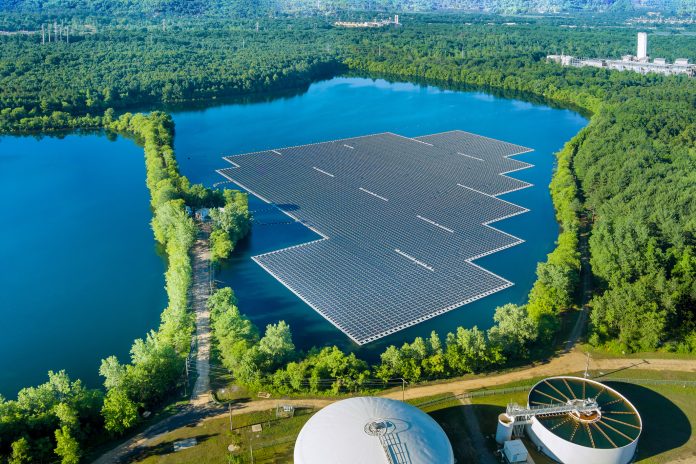New research has revealed that floating solar photovoltaic panels (FPV) could potentially meet all the electricity needs of certain countries
The study, conducted by researchers from Bangor and Lancaster Universities and the UK Centre for Ecology & Hydrology, shows the expansive potential of using FPV on lakes and reservoirs worldwide.
Floating solar photovoltaic panels
The study estimates the daily electrical output for FPV across nearly 68,000 lakes and reservoirs. The researchers focused on water bodies within 10 kilometres of population centres, not in protected areas, that neither dry up nor freeze for more than six months annually.
They calculated the output based on FPV covering 10% of the water surface, up to a maximum of 30 square kilometres.
The results showed that FPV could generate 1,302 terawatt hours (TWh) of electricity annually. This is approximately four times the UK’s total yearly electricity demand.
Dr. Iestyn Woolway of Bangor University, the study’s lead author, emphasised the importance of understanding the environmental impact of FPV. “We still don’t know exactly how floating panels might affect the ecosystem within a natural lake, in different conditions and locations. But the potential gain in energy generation from FPV is clear,” he said.
Achieving electricity demands with FPV
FPV installations offer numerous advantages over land-based solar farms. They free up land for other uses and maintain cooler panel temperatures, enhancing efficiency.
FPV can reduce water loss through evaporation and curb algal blooms by limiting sunlight and preventing nutrient circulation. However, researchers warn that more studies are needed to understand the environmental impact fully.
Country’s that FPV will help
Country-specific findings from the study are particularly promising. Nations such as Papua New Guinea, Ethiopia, and Rwanda could meet their entire electricity needs with FPV.
Bolivia and Tonga could come very close, achieving 87% and 92% of their electricity demands. Many countries in Africa, the Caribbean, South America, and Central Asia could meet between 40% and 70% of their electricity needs through FPV. In Europe, Finland could meet 17% of its demand, and Denmark, 7%.
In the UK, FPV could produce 2.7 TWh annually, supplying electricity to around one million homes. Currently, the UK has few FPV installations, with the largest being a 6.3MW farm on the Queen Elizabeth II reservoir near London.
Professor Alona Armstrong of Lancaster University, a co-author of the study, highlighted the global potential of FPV. “Our work shows there is much potential for FPV around the world. But deployments need to be strategic, considering the consequences for energy security, nature and society, as well as Net Zero.”
The research was funded by the Natural Environment Research Council, part of UK Research and Innovation. With the correct deployment, FPV could significantly contribute to a sustainable energy future.






